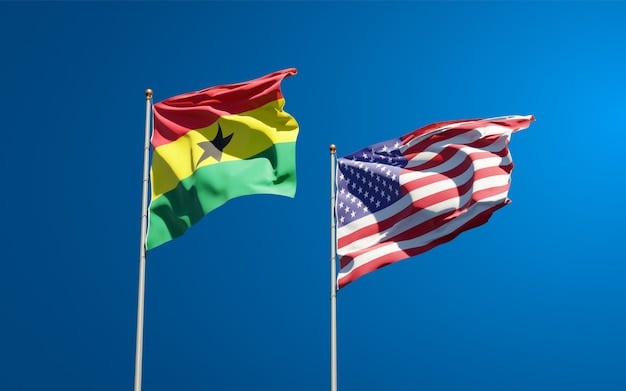Ghanaians have shown a remarkable interest in the outcomes of U.S. presidential elections, driven by deep political, economic, and ideological ties that resonate across continents. This engagement is not rooted in mere curiosity; rather, it reflects a recognition of how U.S. elections significantly influence Ghanaian affairs. Since the advent of democratic governance in Ghana in 1992, the political landscape has been characterized by a stable two-party system dominated by the New Patriotic Party (NPP) and the National Democratic Congress (NDC). Just as in the U.S., where the Republican and Democratic parties alternate in power, Ghana’s political dynamics often mirror those of the United States. Both the NPP and NDC align ideologically with their U.S. counterparts, with the NPP embracing pro-business policies similar to the Republicans, and the NDC advocating for social welfare reforms akin to the Democrats.
Over the years, Ghanaians have noted a fascinating correlation in electoral outcomes between the two nations. Historically, when the Republicans achieved victory in the U.S., the NPP similarly secured the presidency in Ghana. Conversely, when the Democrats won in the U.S., the NDC experienced electoral success back home. This trend reflects a broader pattern of political alignment that influences voter behavior across borders. However, the election cycle of 2020 presented an anomaly, as the NPP won in Ghana while the Republicans lost in the U.S. This deviation from the established pattern has led observers to regard the year as an outlier, suggesting a need for caution when analyzing subsequent political trends.
The upcoming 2024 elections in both countries are particularly significant due to the high stakes involved. Both Ghana and the U.S. are poised to have their sitting vice presidents contesting for the presidency; Dr. Mahamudu Bawumia in Ghana and Kamala Harris in the U.S. Interestingly, both elections also feature former presidents attempting to reclaim their leadership roles, with John Dramani Mahama vying for the presidency in Ghana and Donald Trump in the U.S. This strategic alignment in timing not only reinforces the interconnectedness of their political fortunes but also amplifies the anticipation within Ghana for potential shifts in power in the United States. As the U.S. prepared for its elections on November 5, Ghanaians awaited their own electoral process, slated for December 7.
The outcomes of U.S. presidential elections invariably impact various facets of Ghana’s economy and governance, particularly in terms of trade, foreign policy, and investment. The relationship between the U.S. and Ghana has evolved under different administrations, with American policy decisions significantly influencing key sectors such as trade, health, and security in Ghana. For Ghanaians, understanding the potential ramifications of a change in U.S. leadership is crucial, as it can directly affect economic opportunities and geopolitical alignments. Historical precedents suggest that a Republican win might lead to more pro-business stances favoring the NPP, while a Democratic victory could encourage policies aligned with the progressive reforms supported by the NDC.
One noteworthy distinction between the U.S. and Ghanaian electoral processes is their differing methods of determining their respective presidents. The United States employs an electoral college system, requiring a candidate to secure 270 out of 538 electoral votes to claim victory. In contrast, Ghana operates under a simpler majority rule, where a candidate needs 50% plus one of the votes to be declared the winner. This fundamental difference in electoral framework can lead to varying dynamics and outcomes, which Ghanaians observe with keen interest as they prepare for their own elections. As the 2024 U.S. election results began to unfold, Trump had declared victory with a close tally, capturing 267 electoral votes and nearing the threshold necessary for reelection, heightening curiosity about how these results might resonate with Ghana’s forthcoming electoral cycle.
The anticipated alignment in Ghanaians’ voting preferences based on U.S. election results poses questions about the broader implications for Ghana’s democracy and foreign policy direction. The historical correlation between American and Ghanaian electoral outcomes emboldens political analysts to anticipate similar patterns in upcoming elections. The possibility that Ghanaians may weigh their vote based on the U.S. political landscape raises intriguing considerations about the sovereignty of their electoral choices, given the potent influence of foreign political developments on national sentiments. In an increasingly interconnected world, such relationships highlight the need for Ghana’s political stakeholders to carefully assess how international developments may affect domestic issues, from economic growth to the political climate.
In conclusion, the intricate web of political, economic, and ideological connections between Ghana and the United States indelibly shapes the elections in both countries. The mutual influences between the NPP and the Republicans, as well as between the NDC and the Democrats, have historically set a framework for electoral predictions that resonate with Ghanaians. As both nations gear up for significant elections, the potential ramifications of U.S. presidential results loom large over Ghana’s political landscape. The engagement and awareness demonstrated by Ghanaians serve as a testament to the enduring bond between the two nations, emphasizing the importance of understanding international dynamics in the context of local electoral choices. As both countries navigate complex electoral terrains, Ghanaians remain attentive to the unfolding political narratives across the Atlantic, eager to decipher the implications for their future.


